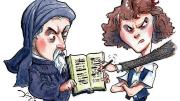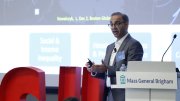Years ago, if memory serves, a New Yorker newsbreak (those column-ending items harvested from other media) captured this community’s braininess by relating one side of a telephone conversation overheard in the Radcliffe registrar’s office: “No, that’s ‘D,’ as in Dostoevsky.” Plus ça change…Primus recently called at Widener’s circulation desk to collect some requested volumes. The staff member who fetched the stuff was wearing a lurid Boston Celtics jersey; Primus complimented her; she replied (the lads were playing in London that week), “I heard there’s a story about the team in today’s Guardian.”
The liberal arts’ value. The Memorial Minute on the late Philip A. Kuhn, Higginson professor of history and of East Asian languages and civilizations, presented to the Faculty of Arts and Sciences on February 6, strongly connected seemingly obscure scholarly discoveries with matters of broad, worldly moment. Thus, as Kuhn worked “to help students interpret seemingly incomprehensible texts,” he told them, “‘There are lies, there are damn lies, and then there are documents’” from which truths emerge. In the case of his most popular book, Soulstealers, “based on a case of supposed witchcraft” in Qing China in the mid 1700s, Kuhn recounted the tale of a suspicious court, “a telltale example of imperial overreach and insecurity,” mass hysteria, and the death of many innocents in “the mystical madness” of the time—because, as he wrote, “‘the empowerment of ordinary people remains, even now, an unmet promise.’”
Chaucer over Coffee. For anyone who forgets, or is too young to remember, how differently the genders were treated not so long ago, this vivid note, from a lovely obituary of Radcliffe board chair Amey Amory DeFriez ’49, crafted by Bryan Marquard and published in The Boston Globe on January 15:
“Two of her brothers were at Harvard, and she attended Radcliffe when some advanced classes had become coed. At times, however, the class material was different for courses segregated by gender. Mrs. DeFriez and one of her brothers each took a Chaucer class from the same professor. ‘At 10 a.m. I attended the expurgated version. My brother at 9 had heard the original with the salacious details,’ she noted. ‘Our 11 a.m. coffee gave us the chance to compare.’”
Panamera populism? At a populist moment in American discourse, one pauses to wonder at the public response to the February announcement that Porsche has become the Ivy League’s official car, entitling it to display its logo at championship tournaments and on Ivy media channels. (It also becomes the sponsor of Penn Athletics.) Given other recent Ivy deals, one imagines fans driving to the Palestra with a Coke in the cupholder, and wearing Nike shoes and Under Armour duds—but is still left, overall, with a rather up-market impression.
Symbolism department. When the appointment of Drew Faust as Harvard’s twenty-eighth president was announced on February 11, 2007, the Barker Center’s Thompson Room was set up so that Daniel Chester French’s bronze bust of John Harvard, perched on the mantelpiece of the fireplace behind the lectern, peered down on Faust and the other speakers, and a stone VERITAS crest backed up the bust: a symbolic conferral of Crimson cred at a moment of great change in the University.
Scroll forward to this past February 11. Senior fellow William F. Lee and president-elect Lawrence S. Bacow spoke before a crimson Harvard University backdrop rotated 90 degrees from the fireplace. Behind it (not visible to viewers of the Facebook broadcast) hangs Joseph DeCamp’s monumental portrait of Theodore Roosevelt, A.B. 1880, LL.D. 1902, an Overseer from 1895 to 1901 and from 1910 to 1916—and, let it not be forgotten, a Republican U.S. president of different persuasions, from a different era.









